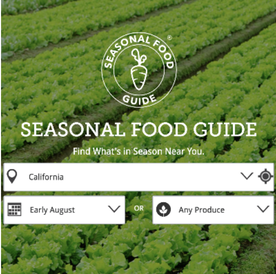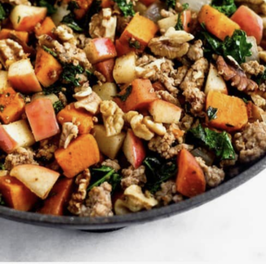Fresh lettuce and tomatoes in the summer, squash soup and apple crisp in the fall - seasonal eating is already built into our diets and culture without us even consciously considering it. But what if seasonal eating had more benefits than adding a festive taste to our menu.
What Is Seasonal Eating?
Seasonal eating is consuming locally grown foods only in the season they are naturally available in.
Why Is This Important?
Temperature and sunlight directly impact the growth of local foods and the "data" from these variables are stored as energy and information for our body to utilize. When you eat locally grown food in its season, you are correctly matching your environment providing your body's physiological functions for optimal health.
What Are The Consequences Of Eating Out Of Season?
Today, food from all over the world is readily available at your local grocery store. But, that's not how it always was and we simply haven't evolved for this model of consumption.
When you eat out of season, you are sending your body mixed messages. For example, if you eat a banana in winter you are telling your body that summer is here and to start storing carbs for the winter when food would be more scarce. Often times, eating the same produce year round can lead to hormonal imbalances, circadian mismatches, difficulty losing weight and a pro-growth environment for diseases. When we eat with the seasons, we are able to send our bodies the correct signals, utilize more nutrients and promote optimal energy levels.
Benefits of Eating Seasonally:
There are so many benefits to eating seasonally and even more being studied every day as researchers begin to give this topic the attention it deserves. Here are a few of the most noticeable benefits that occur when you align your eating habits with the seasons:
A good rule of thumb is to assume sweeter foods belong in the summer whereas fattier, more savory foods belong in the winter.
Spring - During this time you will intake less food and the food you do have should be high in good fats (think clean keto). Consider savory foods versus sweet like roasted vegetables and soups.
Summer - Try to eat outside during these months to help align your biological clock with the seasons. The heat keeps you from overeating and you will find yourself naturally adding more carbs in the form of summer fruits and vegetables as the season goes on. You can also look to replace meat with more fresh, local seafood during these months, as it is generally more readily available.
Autumn - From the summer solstice through now will be your highest daily carb intake (but don't go crazy). As the weather starts to cool down and the fall harvest produce becomes available, you will begin consuming larger portions and feel your hungriest during this time. This would be the season mammals naturally stock up for winter months.
Winter - Like spring, during this time you will intake less food and the food you do have should be high in good fats. In New England, winter would be a time of scarcity for vegetables and we would naturally switch to a more animal based diet. Consider bone broth soups and grass fed meat and make sure you are consuming your meals between sunrise to sunset.
In the modern world, food is becoming a complex topic, but it doesn't have to be. Let nature be your guide to better health!
If you aren't sure what produce is seasonally available in your area, check out the Seasonal Food Guide website. This website allows you to put in your location and time of year to help you discover all the local produce ready for harvest during that season.
Seasonal eating is consuming locally grown foods only in the season they are naturally available in.
Why Is This Important?
Temperature and sunlight directly impact the growth of local foods and the "data" from these variables are stored as energy and information for our body to utilize. When you eat locally grown food in its season, you are correctly matching your environment providing your body's physiological functions for optimal health.
What Are The Consequences Of Eating Out Of Season?
Today, food from all over the world is readily available at your local grocery store. But, that's not how it always was and we simply haven't evolved for this model of consumption.
When you eat out of season, you are sending your body mixed messages. For example, if you eat a banana in winter you are telling your body that summer is here and to start storing carbs for the winter when food would be more scarce. Often times, eating the same produce year round can lead to hormonal imbalances, circadian mismatches, difficulty losing weight and a pro-growth environment for diseases. When we eat with the seasons, we are able to send our bodies the correct signals, utilize more nutrients and promote optimal energy levels.
Benefits of Eating Seasonally:
There are so many benefits to eating seasonally and even more being studied every day as researchers begin to give this topic the attention it deserves. Here are a few of the most noticeable benefits that occur when you align your eating habits with the seasons:
- Fresh, more nutrient available produce - When food is fresh from the garden (or local farm) to your dinner plate, it contains a higher density of nutrients. That is because plants get their nutrients from the sun. Products that are shipped across the country (or world) lose some of their nutrient value because they are kept under artificial light, away from the sun. Eating seasonally helps you choose from locally grown produce that has had a full life in the sun - the same seasonal sunlight that you have been living under, making it the perfect nutrient match for your body. Nutrient dense food contains more energy that your body can utilize to help power through the day.
- Leads to a more long term sustainable diet - Seasonal eating provides a constant rotation of produce making it easier to change things up without cheating. This can be confusing as many people contribute a diet to eating the same foods year round. But paleo, keto and lectin free diets can all fit within seasonal eating template and help make these lifestyles more sustainable through variety.
- Improves overall health and the environment - When you eat seasonally, you tend to eat local, organic foods. This benefits the environment by creating a more sustainable food chain that works with local producers instead of against them. Additionally, your body receives signals from your surrounding environment - when you match those signals to your food consumption, your body can align with the correct circadian rhythm, develop healthy gut flora, and maintain optimal energy levels.
- Weight loss at the correct time of year - Humans, like most mammals, follow the biological clock of our surrounding environment. When we correctly match the food we eat to our environment's temperature and sunlight signals, we will naturally lose weight in the winter and early spring. Seasonally, food is less readily available during these months and we have adapted to store the carbs we eat in the summer months as fat to later burn off for heat in the winter. By eating within the correct season (and getting outside), your body will naturally adapt to these seasonal weight loss and gain patterns.
A good rule of thumb is to assume sweeter foods belong in the summer whereas fattier, more savory foods belong in the winter.
Spring - During this time you will intake less food and the food you do have should be high in good fats (think clean keto). Consider savory foods versus sweet like roasted vegetables and soups.
Summer - Try to eat outside during these months to help align your biological clock with the seasons. The heat keeps you from overeating and you will find yourself naturally adding more carbs in the form of summer fruits and vegetables as the season goes on. You can also look to replace meat with more fresh, local seafood during these months, as it is generally more readily available.
Autumn - From the summer solstice through now will be your highest daily carb intake (but don't go crazy). As the weather starts to cool down and the fall harvest produce becomes available, you will begin consuming larger portions and feel your hungriest during this time. This would be the season mammals naturally stock up for winter months.
Winter - Like spring, during this time you will intake less food and the food you do have should be high in good fats. In New England, winter would be a time of scarcity for vegetables and we would naturally switch to a more animal based diet. Consider bone broth soups and grass fed meat and make sure you are consuming your meals between sunrise to sunset.
In the modern world, food is becoming a complex topic, but it doesn't have to be. Let nature be your guide to better health!
If you aren't sure what produce is seasonally available in your area, check out the Seasonal Food Guide website. This website allows you to put in your location and time of year to help you discover all the local produce ready for harvest during that season.
| Websites Want to know what is seasonally available in your area? Seasonal Food Guide is a fantastic website to plug in your location and see what is in season from herbs to vegetables to fruit! |
| Recipes Filled with apples, sweet potatoes, walnuts and parsley, this Sausage Apple Hash recipe has all the seasonal favorites! |




 RSS Feed
RSS Feed